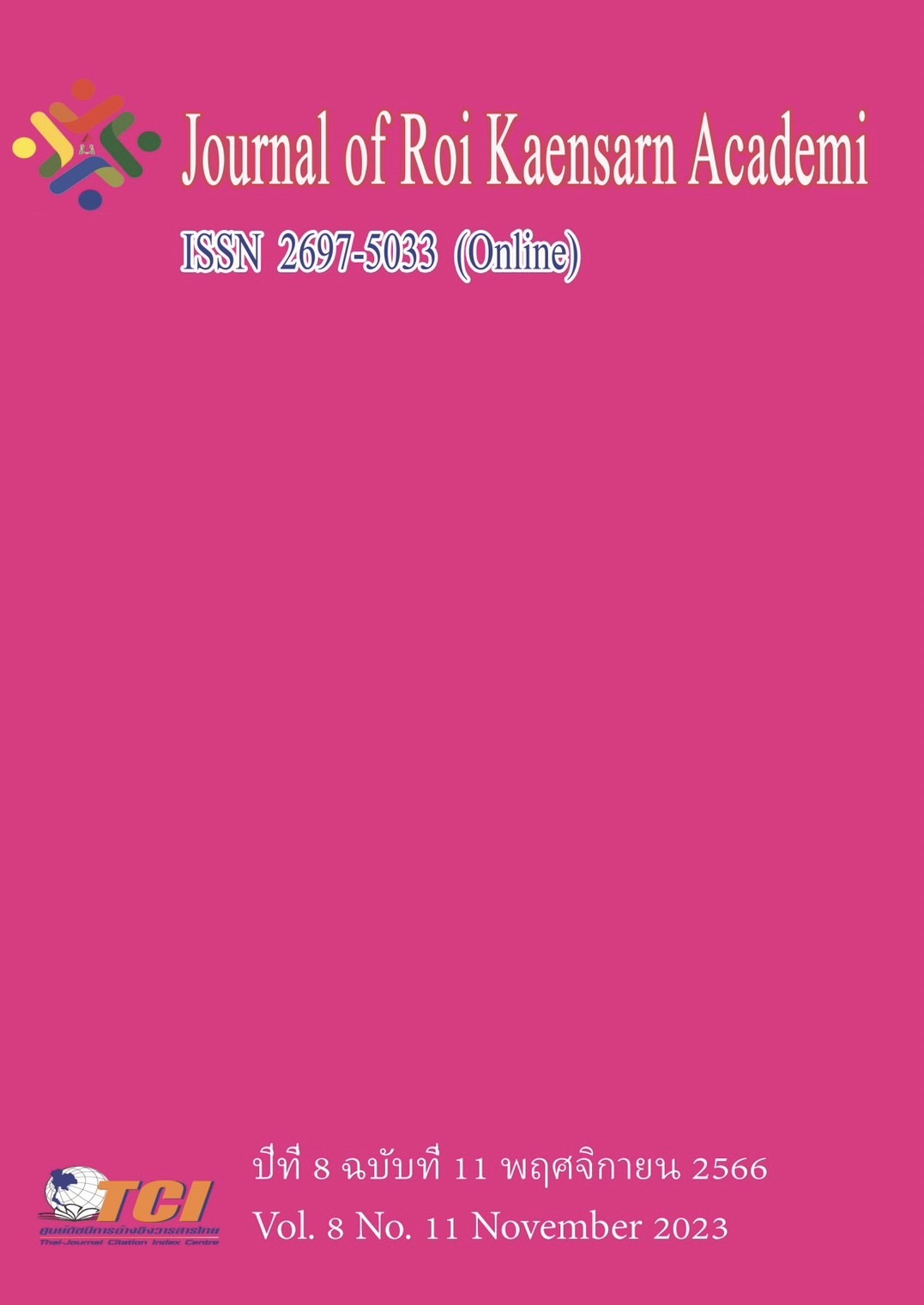The Development of Blended Teaching model Based on Deep Learning Theory to Enhance college students' critical thinking
Main Article Content
บทคัดย่อ
The purposes of the study are 1) to investigate the current situation of college students' critical thinking,2) to develop the blended teaching model based on deep learning theory to enhance college students' critical thinking, and 3) to access the efficiency of the instruction model. The Population is about 7,000 sophomores of G University in the semester 1 academic year 2023.The sample groups for this research were 1) 400 sophomores who participated in the questionnaire survey, 2) 50 sophomores who participated in a quasi-teaching experiment. The research instruments were 1) college students’ critical thinking disposition scale,2) lesson plan of the "CIPSE" model, 3) examination paper of college students' critical thinking ability. The results were found that:1)college students' critical thinking level is generally good ( = 4.75),2)This study has developed a blended teaching model based on Deep Learning Theory named the "CIPSE" model,3)After teaching experiment, the data show that the "CIPSE" model has obvious functions in cultivating college students' critical thinking ability.
Article Details
เอกสารอ้างอิง
Akylbek Meirbekov, Inga Maslova, Zemfira Gallyamova. (2022). Digital education tools for critical thinking development, Thinking Skills and Creativity,Volume 44.
David Hitchcock, Zhang Yifan and Zhou Wenhui. (2012).Critical Thinking as an Educational Ideal. Journal of Higher Education (11),54-63.
Dong Yu. (2019).On Relationships between Logic and Critical Thinking. Journal of Higher Education (03),14-21.
Facione, P. A., Facione, N. C., and Giancarlo, C. A. (1997). Professional judgment and the disposition toward critical thinking. Retrieved Nov, 21, 2020.
Guo Hua. (2016).The Deep Learning and Its Significance. Curriculum, Teaching Material and Method (11),25-32.
Intarasompun, W., Muangnual, P., and Punchatree, N. (2022). Active Learning Management and Using E-Portfolio as Authentic Assessment for Teacher Students. Journal of Yanasangvorn Research Institute Mahamakut Buddhist University, 13 (2),108–118. Retrieved from https://so04.tci-thaijo.org/index.php /yri/article/view/262856
Lee, K. S. (2004). Effects of individual versus online collaborative case study learning strategies on critical thinking of undergraduate students. The University of Texas at Austin.
Li Li and Gao Yanhong. (2021).Blended Learning Design to Promote Deep Learning in Colleges and Universities. Heilongjiang Researches on Higher Education (05),148-153.
Liu Hui, Teng Meifang and Zhang Peng. (2020).What is the Difficulty of Blended Instruction Design: An Analysis of Blended Instruction Design Planning Based on Rasch Model. China Higher Education Research (10),82-87+108.
Liu Yi and Zhao Juming.(2010). The Investigation of Undergraduate Students′ Critical Thinking Disposition—Taking a Local Comprehensive University as an example. Research in Higher Education of Engineering (01),81-85.
Norberg, A., Dziuban, C. D., and Moskal, P. D. (2011). A time‐based blended learning model. On the Horizon, 19 (3), 207-216.
Ren zhanying.(2022).Analysis on the high-quality development path of vocational education in the new era. Chinese Vocational and Technical Education (10),5-11.
Saadati, Z., Zeki, C. P., and Vatankhah Barenji, R. (2021). On the development of blockchain-based learning management system as a metacognitive tool to support self-regulation learning in online higher education. Interactive Learning Environments, 1-24.
Tosati, S. ., Sitthisopasakul, T., and Intarasompun, W. . (2021). Enhancing Learning Process by Integrating Contemplative Education Coaching System and Research Base Learning (Ccr) to Strengthen Teacher’s Competencies in Educational Measurement Evaluation and Research Program, Faculty of Education, Bansomdejchaopraya Rajabhat University. Journal of Modern Learning Development, 7 (1),124–137.
Wichean Intarasompan, and Jittawisut Wimuttipanya (2021). A quality in education of lower central network school with coaching and mentoring pass online system. Turkish Journal of Computer and Mathematics Education. Vol.12 No. 8 (2021). Retrieved from https://turcomat.org/index.php/turkbilmat/article/view/3819
Wu yanru.(2014).An empirical study on blended learning promoting the development of college students' critical thinking ability. e-Education Research (08),83-88.
Yakob, M., Sari, R. P., and El Islami, R. A. Z. (2020) . The effectiveness of science experiment through multimedia teaching materials to improve students’ critical thinking. In Journal of Physics: Conference Series (Vol. 1567, No. 4, p. 042018). IOP Publishing.
Yen, J. C., and Lee, C. Y. (2011). Exploring problem solving patterns and their impact on learning achievement in a blended learning environment. Computers and Education, 56 (1), 138-145.

